
|
|||
|
|||
|
Tuesday, November 04, 2008
There isn't anything I could say tonight ...
Sunday, July 27, 2008
"He ventured forth to bring light to the world ..."
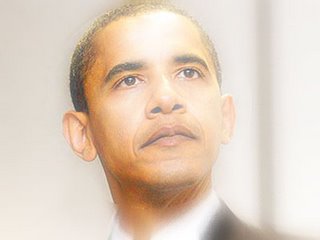 He ventured forth to bring light to the world -- The anointed one's pilgrimage to the Holy Land is a miracle in action - and a blessing to all his faithful followers", says Gerard Baker (Times of London July 25, 2008):
He ventured forth to bring light to the world -- The anointed one's pilgrimage to the Holy Land is a miracle in action - and a blessing to all his faithful followers", says Gerard Baker (Times of London July 25, 2008):And it came to pass, in the eighth year of the reign of the evil Bush the Younger (The Ignorant), when the whole land from the Arabian desert to the shores of the Great Lakes had been laid barren, that a Child appeared in the wilderness. Gerard Baker's column is now televised in its entirety, courtesy of FoxNews. Of course, See ObamaMessiah.blogspot.com for a chronological history of the Obama-Messiah phenomenon. Labels: politics
Monday, January 28, 2008
Some Political Reading . . .
Just to alert my reader that if I'm not posting here, there's a good chance that I'm posting to our collective blog: Catholics in the Public Square, featuring contributions from Jay Anderson (Pro Ecclesia), Oswald Sobrino (Catholic Analysis), Jeff Miller (Curt Jester) and David Schrader (Catholics for Bush) -- together with my own meager contributions:
One of my daily haunts is Vox Nova: Catholic Perspectives on Culture, Society and Politics -- a blogging collective of "diverse social outlooks, traversing a wide range of demographics and political sympathies," striving to be "free, to the furthest extent possible, from partisanship, nationalism and demagoguery, all of which banish intellectual honesty from rational discourse." Whether or not they actually succeed in this endeavor is of course part of the appeal, along with thought-provoking (and sometimes infuriating) discussions in the combox. I also check in occasionally with:
Labels: other blogs, politics
Monday, July 23, 2007
USCCB - Played by House Democrats?
The U.S. bishops have agreed to meet with a group of Catholic House Democrats to discuss how to pursue the goal of a "responsible transition" to end the war in Iraq. (Catholic News Service July 19, 2007):
"The current situation in Iraq is unacceptable and unsustainable," wrote Bishop Thomas G. Wenski of Orlando, Fla., chairman of the bishops' Committee on International Policy, in a July 17 letter to Rep. Tim Ryan, D-Ohio. A copy of the letter was released July 18 by the U.S. Conference of Catholic Bishops.Funny thing: among these 14 Catholic Democrats -- Tim Ryan (OH), Rosa DeLauro (CT), Jose Serrano (NY), Jim Moran (VA), Joe Baca (Ca), Hilda Solis (CA) -- are those who publicly joined together in May 2007 to criticize Pope Benedict's statement that pro-abortion politicians should not receive Communion. Diogenes (Off the Record) comments on "our shared moral tradition": A practical politician might have told these 14 Democrats that if they don't want to hear from the Catholic Church about abortion, they shouldn't look to hear from the Church about the war in Iraq. A concerned pastor might have told them that if they disregard the Church's teaching on a clear issue of moral teaching, they should not be so hypocritical as to invoke Church teaching on an issue that is not nearly so clear-- an issue on which loyal Catholics can and do differ. But the USCCB leaders didn't choose those options. Instead the USCCB implicitly accepted the lawmakers' claim that they are the moral champions of Catholic teaching.while Jay Anderson (Pro Ecclesia) is "awaiting 2 unlikely things to occur": Lastly, Deal Hudson muses "how the USCCB could avoid being a political pawn in the hands of the House Democrats. Labels: politics
Monday, June 04, 2007
Fred Thompson to Run for President?
 Run Fred Run! - Prof. Stephen Bainbridge offers a few reasons why he hopes to see former Senator-turned-actor Fred Thompson run for President on the GOP ticket -- among them: Run Fred Run! - Prof. Stephen Bainbridge offers a few reasons why he hopes to see former Senator-turned-actor Fred Thompson run for President on the GOP ticket -- among them:Unlike say Hillary or Romney, he hasn't been planning to run for President ever since s/he got elected President of the 9th Grade class and the senior football players ran his/her underwear up the flagpole, as illustrated by his famous comment that "After two years in Washington, I often long for the realism and sincerity of Hollywood."Here's a few more points in Thompson's favor: He authored a piece for the National Review (March 15, 2007) titled: Gandhi's Way Isn't the American Way. He took on Michael Moore. And some facts are circulating concerning Fred Thompson's other, er, abilities (Source: Better Off Fred Jonah Goldberg (National Review June 1, 2007) and Frank Facts About Fred Thompson" IMAO:
On a more serious note, The Roman Catholic Blog is discussing the matter of Fred Thompson & Abortion (he seems to have a solid pro-life legislative record and merited the disapproval of NARAL). I loathe Giuliani and believe he is a disaster for the GOP; if you've been reading Catholics in the Public Square, you'll know I support and appreciate Senator Brownback, but I have to wonder if Brownback has what it takes to garner popular support and come out ahead? -- Still pretty early. I'd so love to see Thompson go head to head against Hillary. Update: For all things Fred, try the Fredipedia.
Monday, February 12, 2007
Israel-Vatican Relations & The Fundamental Agreement
On December 30, 1993, the Fundamental Agreement was signed by Msgr. Claudio Celli, Vatican assistant secretary of state and Israel's deputy minister of foreign affairs, Yossi Beilin, paving the way to full diplomatic relations between the two parties in 1994:
The Fundamental Agreement extends the theological advances of Nostra Aetate into the political realm, creating for the first time formal diplomatic relations between the Holy See and the State of Israel. The Agreement signifies a historic step in the evolution of the Roman Catholic Church’s attitude toward Judaism and the Jewish People.[Source: Milestones in Israel-Holy See Relations 1993-2005: Commemoration of the 40th Anniversary of Nostra Aetate Consulate General of Israel in New York]. In 1997 the "Legal Personality" Agreement between the State of Israel and the Holy See was signed: [regularizing] the status and legal personality of the Roman Catholic Church and its institutions under Israeli law, after approximately 500 years of undefined legal status under Ottoman Empire, the British Mandate, and Israeli sovereignty.
These were open talks, launched at the Vatican’s initiative in the summer of 1991, even before the Madrid Conference. It was Archbishop Andrea Cordero Lanza di Montezemolo, the apostolic delegate in Jerusalem, who announced the Vatican’s intention to initiate negotiations on an agreement with Israel, and he did so in consultation with Dr. David Jaegar, an Israeli Jew who had become a Franciscan priest, with boasted special knowledge in Canon Law. Each party came to the table with its own priorities -- for Israel, the objective was (understandably) "the common war on anti-Semitism and unequivocal recognition of the State of Israel." For the Church, the concern lay with the rights of Catholics residing in the State of Israel: . . . the guarantee of freedom of worship for Catholics, the legal status of priests, and the special approach of Pope John Paul II, who, as early as 1981, had sent to the President of the State of Israel a blessing for the New Year, and in 1986, had visited the synagogue in Rome – symbolic acts which stressed – alongside a long list of other acts – his special deep respect for Israel and its people. 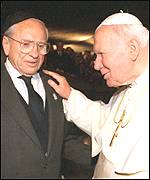 John Paul II's greetings to Israel in celebration of their new year appears to have sprung from a collaboration with his lifelong friend Jerzy Kluger, who played a subtle yet instrumental role (at the Pope's request) in facilitating communication between Israel and the Vatican (How a Pope's Boyhood Friend Helped Forge Ties to Israel): John Paul II's greetings to Israel in celebration of their new year appears to have sprung from a collaboration with his lifelong friend Jerzy Kluger, who played a subtle yet instrumental role (at the Pope's request) in facilitating communication between Israel and the Vatican (How a Pope's Boyhood Friend Helped Forge Ties to Israel):When the Archbishop was named Pope in 1978, he stunned the world by granting his first papal audience, or formal reception, to Mr. Kluger and his family.(Pope John Paul II and Jerzy Kluger's friendship was made the subject of Darcy O'Brien's The Hidden Pope: The Untold Story of a Lifelong Friendship (Roedale Books, 1998). Related Commentary on The Fundamental Agreement
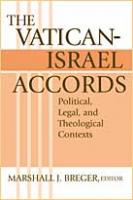 The Vatican-Israel Accords: Political, Legal, and Theological Contexts, edited by Marshall J. Breger. University of Notre Dame Press (February 2004). [Contents]. The Vatican-Israel Accords: Political, Legal, and Theological Contexts, edited by Marshall J. Breger. University of Notre Dame Press (February 2004). [Contents].Published during the tenth anniversary year of The Fundamental Agreement, The Vatican-Israel Accords brings together essays that analyze the legal, historical, theological, and political meaning of the Accords. The compelling essays in this collection explore not only the document and events surrounding its signing, but also the past, present, and future of Catholic-Jewish relations. Contributors, who include scholars from Israel, Italy, France, Spain, and the United States, contend that the history and structure of the Accords offer lessons that may be instructive for others involved in seeking peaceful resolutions to conflict, particularly those who work for peace between Palestine and Israel. Contributors: Marshall J. Breger, Laurenzo Cremonesi, Msgr. Richard Mathes, David-Maria A. Jaeger, O.F.M., Leonard Hammer, Silvio Ferrari, Rafael Palomino, Msgr. Roland Minnerath, Rabbi David Rosen, Moshe Hirsch, Geoffrey Watson, Giorgio Filibeck, Ruth Lapidoth, Fr. Drew Christiansen, S.J., and Rabbi Jack Bemporad. MARSHALL J. BREGER is professor of law at the Columbus School of Law, Catholic University of America. Reviews "The Vatican-Israel Accords promises to make a tremendous contribution to understanding a tangled relationship. It is a unique, and uniquely valuable, volume." --George Weigel, Ethics and Public Policy Center, Washington, D.C. Israeli-Catholic relations since the 1993 signing have not always gone smoothly. Sandro Magister reported on two impediments to Israeli-Vatican relations and the subsequent implementation of the Vatican-Israel accords (with regards to financial issues and the status of Church property) in 2005: The first skirmish came on July 12. That day, John Paul II was commemorated in the Israeli parliament, the Knesset. And on that occasion, apostolic nuncio Pietro Sambi delivered a speech that was reprinted in its entirety by "L'Osservatore Romano" six days later.For further analysis on Pope Benedict's 2005 omission of Israel from a list of recent victims of terrorism, I refer to John Allen Jr.'s "Context crucial in Vatican-Israel uproar" (National Catholic Reporter, August 12, 2005). After some tit-for-tat jousting between diplomats, Israeli Prime Minister Ariel Sharon moved to resolve any ill-feelings with the Vatican in a personal letter ("Israel, Vatican mend fences after dispute over pope's terrorism comments", by Arial David. World Wide Religious News August 27, 2005): In his letter, Sharon said Benedict's efforts to promote dialogue with Jews and Israel made him "a true friend of Israel, genuinely committed to advancing tolerance, understanding and reconciliation," Ben Hur said in a phone interview, reading from the letter. He said Sharon then explained the reasons for his country's reaction to the omission. 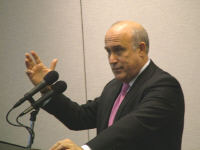 In August 2006, Magister also featured an interview with Israeli ambassador Oded Ben Hur, in which he commmented further on Israel's perception of Pope Benedict and Israel's expectations of Rome: In mid-July, just when the war had broken out in Lebanon, [Oded] was deeply troubled by the first statements from the Vatican authorities: “All of them went the same way, against Israel. The true aggressor, Hezbollah, wasn’t even mentioned by name. But after this the judgments became more balanced.” In December of 2006 Israeli Prime Minister Ehud Olmert met with Pope Benedict XVI (Catholic News Service Dec. 14, 2006) - among the topics of discussion was the "dwindling Catholic population in the Holy Land, including in Bethlehem," and peace in the Middle East: Ben-Hur said Pope Benedict thanked the prime minister for Israeli's declaration of a cease-fire with Palestinian militias, although Ben-Hur said the prime minister said it is getting more and more difficult "to withhold reactions" to missiles being launched into Israel from Gaza. Talks between Israel and the Vatican resumed in 2007 with the goal of applying the provisions of the Fundamental Agreement's over the holy places, the Church‘s properties, and finances. In Holy See-Israel: painstaking resumption of negotiations (AsiaNews.it Bernardo Cervellera, December 12, 2006), Oded Ben Hur gave another interview on the nature of the impediments to negotations. Related Resources
Updates
Labels: israel, john paul II, politics
Monday, January 22, 2007
Archbishop Donald Wuerl - Aiding & Abetting Nancy Pelosi?
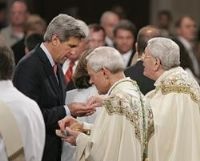 LifeSiteNews' carries a disappointing story on the new Archbishop of Washington Donald Wuerl, who has decided to pursue a path of steadfast faithfulness to . . . . imitating the scandalous complacency of his predecessor Cardinal McCarrick towards "pro-choice Catholic" legislators. LifeSiteNews reports: LifeSiteNews' carries a disappointing story on the new Archbishop of Washington Donald Wuerl, who has decided to pursue a path of steadfast faithfulness to . . . . imitating the scandalous complacency of his predecessor Cardinal McCarrick towards "pro-choice Catholic" legislators. LifeSiteNews reports:Perhaps it was a bad omen when at the installation Mass for the new Archbishop of Washington Donald Wuerl last June, pro-abortion Democratic Senator John Kerry was given Holy Communion and caught on camera in the act. During the entrance procession, Archbishop Wuerl shook hands with Kerry and Senator Ted Kennedy. (see coverage)When California Catholic Daily reporter Allyson Smith inquired during an interview as to whether Wuerl planned to "discipline her at all for being persistent and obstinate about supporting abortion and same-sex marriage," Wuerl responded, "I will not be using the faculty in that, in the manner you have described."
I think what Archbishop Wuerl and others fail to understand is the impact of things like this on the lay Catholic who is struggling to be a faithful disciple in the world. The message that is sent by silence is strong, in terms of the lay apostolate in the world, in terms of the unity of faith and life.
. . . Regarding the grave sin of abortion or euthanasia, when a person’s formal cooperation becomes manifest (understood, in the case of a Catholic politician, as his consistently campaigning and voting for permissive abortion and euthanasia laws), his Pastor should meet with him, instructing him about the Church’s teaching, informing him that he is not to present himself for Holy Communion until he brings to an end the objective situation of sin, and warning him that he will otherwise be denied the Eucharist.Earlier this month, The National Abortion Rights Action League commended self-styled "Catholic grandmother" Nancy Pelosi for championing "pro-choice values" for nearly 20 years -- a pretty consistent -- or obstinant -- record on abortion, wouldn't you agree? People being what they are, there must be a measure of "organization"—buildings, offices, procedures, finances, programs, and the like—if the Church is to do her work. But after a certain point, the instinct for institutional self-preservation outweighs the desire for evangelical credibility. If these "Catholic" politicians keep persisting in walking up the communion aisle, why can't the communicants in their seats stand up and stop them by merely standing in their way much like that young man in Tiannamen Square before the tanks?
When the aforementioned Nancy Pelosi orchestrated a four-day gala in Washington celebrating her familial, ethnic, and—very explicitly—Catholic identity, people were alert to what would be said by the new archbishop of Washington, Donald Wuerl. He said nothing. Part of the festivities was a Mass at Trinity College, a Catholic institution in Washington. The celebrant of the Mass was Father Robert Drinan, a Jesuit who, more than any other single figure, has been influential in tutoring Catholic politicians on the acceptability of rejecting the Church’s teaching on the defense of innocent human life. Asked by a reporter, Archbishop Wuerl responded that Fr. Drinan has “faculties” in Washington, meaning he is authorized to celebrate the sacraments. That was it.Related "Must Read" Posts:
Labels: politics
Tuesday, November 01, 2005
Guidelines for Catholic Political Action
Phoenix, Oct. 28, 2005 (CNA) - “The ultimate political goal for Catholics must be the achievement of public policies and laws that result in the legal protection of all innocent human life and that promote the dignity of each human person without exception and compromise”, states a new document setting guidelines for political action.Source: Catholic News Agency Oct. 28, 2005. The 10-point Guidelines for Catholic Political Action is posted to Catholics in the Public Square by my fellow editor David Schraeder, along with a list of participants, courtesy of Deal Hudson's newsletter. Labels: politics
Samuel Alito: "A Penance Well Served"
 Sometimes you can test the merit of a political candidate by the ranting of the opposition -- in this case, note the reaction of MoveOn.Org: Sometimes you can test the merit of a political candidate by the ranting of the opposition -- in this case, note the reaction of MoveOn.Org:. . . This morning, with his administration growing weaker by the day, President Bush caved to pressure from the radical fringe of the Republican Party and nominated Samuel Alito to replace Sandra Day O'Connor on the Supreme Court. Alito is a notoriously right-wing judge on the Third Circuit Court of Appeals. He has consistently ruled to strip basic protections from workers, women, minorities and the disabled in favor of unchecked power for corporations and special interests. . . .With one stroke, President Bush reunites his conservative base and has liberal pundits frothing at the mouth. Here's a roundup of further reaction from both sides of the political spectrum:
Labels: politics
Sunday, May 15, 2005
Fr. Michael Orsi on "Different Levels of Catholic Teaching"
In an earlier post I had referenced the article "Different Levels of Catholic Teaching", by Michael P. Orsi (Homiletic & Pastoral Review December 2003). The new website for the periodical had made it available at the time of the original posting, then removed it (explanation was that articles were in "temporary rotation"); it now appears to be available again, I presume with the recognition that having appeared online it is now the focus of several discussions (by Fr. Kimel's Pontifications as well).
[Update May 17, 2005 - Oops! They removed it again. Here's the cached copy via Google -- CB]. Responding to his critics in First Things, George Weigel had observed that the Pope and the Holy See "speak in a number of different registers: magisterial, doctrinal and theological, pastoral and prophetic. To conflate those several papal voices into equivalent acts of papal magisterium with equal binding authority on the consciences of Catholics is to make an elementary mistake in ecclesiology." Fr. Orsi turns to "A Doctrinal Commentary on Ad Tuendam Fidem" (1998) for further clarification, identifying the following levels and categories of Catholic teaching: (Regarding the third category, Fr. Orsi adds the following qualification:) It must be noted, however, that eternal salvation does not depend on one's adherence to the modified form of capitalism that the Pope suggests in Centesimus Annus (1991) [n. 35], or one's approval of the mandatum requirement (license to teach as a Catholic theologian) for teachers of theology in Catholic higher education in the Apostolic Constitution Ex Corde Ecclesiae. Similarly, no one is required to embrace "The Mysteries of Light" as an integral part of the recitation of the rosary as recommended by Rosarium Virginis Mariae. On the question of whether Catholic disagreement with the Pope on matters of capital punishment and war constituted dissent (in the same manner as, say, Senator Kerry's assertion that he could be a "pro-choice Catholic" and remain in communion with the Church), or whether they were considered, quoting Cardinal Ratzinger, areas of "legitimate diversity of opinion", here is Fr. Orsi's explanation: Having said this, it must be noted that there may be different levels of teaching found in the same document. For example, there is no doubt about the non-fallible prohibitions against abortion [nn. 58-63] and euthanasia [nn. 64-67] found in Evangelium Vitae. In these paragraphs, reference to the constant Catholic teaching on these issues is well documented, and the strong words used by the Pope leave no doubt as to the binding force of the prohibitions. His advice, however, in the same document that capital punishment "be used rarely if ever used" [n. 56] is a prudential teaching which deserves careful consideration. This is not binding since the long tradition of the Church on this issue allows the state the right to execute criminals for its protection and to exact retribution. While one would incur excommunication for procuring or promoting abortion, this would not be the case if one favored the death penalty. Another example of the Pope's prudential but nonbinding teaching is when he spoke through his press secretary, Joaquin Navarro-Valls, regarding America's war against Iraq. He stated that "[w]ar is always a defeat for mankind" and that "[i]t is to be deplored that the path of negotiations, according to International Law, for a peaceful solution of the Iraqi drama has been interrupted." In counseling peace and deploring war, the Pope speaks as the prophetic Vicar of Christ, but he in no way condemns a specific war as unjust since he knows that it is in the provenance of the civil realm to decide if a war meets the criteria listed in the Just War Theory (Catechism of the Catholic Church # 2309). Therefore, a Catholic may either support or reject a war as just. The Pope's words as chief pastor of the flock deserve respectful hearing and should be considered seriously in one's personal deliberations on these issues. Fr. Orsi concludes: What we have seen, then, is that the weight of a document depends on many factors, both intrinsic and extrinsic. Intrinsic factors include the type of document, the promulgator of the document, the language used in each proposition contained in the document, and the tradition behind the teaching or discipline. My last post had provoked a flurry of comments and (somewhat heated) discussion with respect to Cardinal Ratzinger's statement "Worthiness to Recieve Commmunion: General Principles": "Not all moral issues have the same moral weight as abortion and euthanasia. For example, if a Catholic were to be at odds with the Holy Father on the application of capital punishment or on the decision to wage war, he would not for that reason be considered unworthy to present himself to receive Holy Communion While the Church exhorts civil authorities to seek peace, not war, and to exercise discretion and mercy in imposing punishment on criminals, it may still be permissible to take up arms to repel an aggressor or to have recourse to capital punishment. There may be a legitimate diversity of opinion even among Catholics about waging war and applying the death penalty, but not however with regard to abortion and euthanasia. To which Jerry, displaying his affection for quotation marks, offered the following: What constitutes the intrinsic logic of "legitimacy" insofar as it is associated with a "diversity of opinion?" Why is some opinion "legitimate" and some opinion not "legitimate?" What constitutes the nature of legitimacy? Clearly, one would think there are distinctions to be made here. Why is Fr. Reese, SJ's opinion "not legitimate?" Why is Novak's opinion on Iraq considered by some to be "legitimate?" What constitutes "legitimacy?" Was Fr. Reese, SJ's decision to publish opposing views in America a "moral judgment" on the "legitimacy" of "dialogue" between diverse opinions or a "moral judgment" about the "legitimacy" of the diverse opinions themselves? Is dialogue "legitimate?" What is "legitimate dialogue?" Back to the question of a "legitimate diversity of opinion." Outside the context of doctrine, how would you distinguish between a "legitimate diversity of opinion" -- about moral matters, let's say -- and moral pluralism? Is one reducible to the other? If not reducible, which I suspect is the case, on the basis of what would they be distinguished. Good questions, and here I would expect -- humbly request, rather -- my readers to jump in on this as well (as they are likely more educated and qualified than I). As far as Fr. Reese and America is concerned, the CDF's concern was that the very action of publishing pro/con positions editorials on issues on which the Church has already spoken lends the impression to readers that "the jury is still out." Mark Brumley @ InsightScoop comments: By publishing, say, a pro-homosexual-marriage piece and a pro-Catholic-view-of-marriage piece side-by-side, AMERICA gives the impression that this is a subject up for legitimate debate within Catholicism and that AMERICA is the place to go to participate in that debate. Likewise, by publishing "moderate" proaborts side-by-side with people who embrace Catholic teaching on the right to life, AMERICA grabs the rhetorical middle ground and assumes the guise of defining what is acceptable discussion within Catholicism. By publishing "name" Catholic commentators who are orthodox, AMERICA can draw attention to itself as it says, "See, we give both sides their chance"--as if on many of the issues under discussion there are two legitimate sides within the Catholic Church, when in fact there aren't. The last approach has the added benefit to AMERICA of putting the orthodox folks in a bind. They can forego contributing to AMERICA because of its dissenting stance and miss the opportunity to have articulate people defend orthodoxy. Or they can contribute and get their message out but risk adding to AMERICA's perception of legitimacy or balance. But Catholics shouldn't be forced by a Catholic publication into the position of having to choose either to participate in a debate that can mislead people into thinking the subject matter at hand is legitimately a matter of debate among Catholics or to say nothing, thereby missing the opportunity to defend the truth. Fr Orsi's article is helpful in discerning those areas where "legitimate diversity of opinion" is possible between Catholics, and why moral debate is permitted on some issues, but not others. However, to say that "diversity of opinion" is permitted shouldn't be reduced to an "anything goes" approach. Moral debate should occur with due attention to the teachings of the Holy Father and the bishops, referencing the breadth of Catholic tradition. I think that one reason why contemporary perspectives on capital punishment and armed warfare are met with resistance by some Catholic scholars is that they appear to be at variance with Catholic tradition over its 2,000 year history -- for example, the erroneous interpretation that capital punishment itself is a violation of the right to life, equatable to abortion and euthanasia (see Avery Dulle's "Capitalism & Catholic Punishment" First Things 112 April 2001). Or, the claim by Archbishop Martino in March 2003 that "there is no such thing as a just war"; and the elevation of John Paul II's expression "War never again!" -- what should, of course, be the desire by every Catholic -- into a formal proclamation concerning the legitimacy of the use of force itself (see "No Just War Possible?", by George Weigel. The Catholic Difference April 2003), thus contributing to the criticism that some in the Vatican had adopted what amounts to a "functional pacifism" contrary to traditional Church teaching on war. Labels: politics
Tuesday, January 25, 2005
Reflections on the 55th Presidential Inauguration - A Roundup
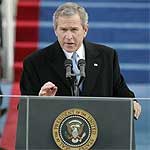
Labels: politics
Monday, January 24, 2005
Fr. Richard J. Neuhaus on "communio" & respect for the Eucharist
 As for the controversy about pro-abortion Catholic politicians receiving Communion, we must hope that the discussion started will continue. This is not just about pro-abortion politicians. It engages the much deeper question of the connection between "communion" and receiving Communion.
To be rightly disposed to receive the Eucharist is to be in communion with the Church, which includes faithful adherence to the Church's magisterial teaching. Especially in America where there is a multitude of Christian denominations, many Catholics have assumed the Protestant attitude that the local parish is simply their religion of choice. The parish is the local franchise of the Catholic Church, much as they might patronize the local franchise of McDonald's. It is further assumed that everybody has a "right" to receive Communion, just as everybody has a right to purchase a Big Mac. Obviously, this is a severe debasement of "communion" and Communion. In the Eucharist, we receive Christ and Christ receives us, incorporating us into his body the Church, which is, most fully and rightly ordered through time, the People of God in communion with bishops who are in communion with the Bishop of Rome. To be rightly disposed entails confessing whatever in our lives contradicts or compromises that "communion" with Christ and his Church and then receiving absolution. Sadly, the sacrament of reconciliation has fallen almost into desuetude in many places, and certainly not only in the United States. One, therefore, must hope that the election-year controversy over pro-abortion politicians will lead to a much more comprehensive renewal of Catholic understanding and practice with respect to authentic "communio." Excerpt from Zenit's interview w. Fr. Neuhaus "On the Eucharist and Its Relationship to "Communio" January 23, 2005. Questions for further reflection and discussion:
Labels: politics
Saturday, January 22, 2005
Remembering Roe v. Wade
Labels: politics
Monday, December 13, 2004
FUGGEDABOUTIT!?" -- A response to Rev'd Canon Lesley A. Northup
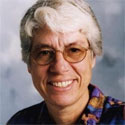 Nathan at Fides, Spes, Caritas calls my attention to the text of what I would describe as "a spirited homily" by Episcopalian Rev'd Canon Lesley A. Northup, calling upon her parishioners to "Get Real - Read The Book". Nathan at Fides, Spes, Caritas calls my attention to the text of what I would describe as "a spirited homily" by Episcopalian Rev'd Canon Lesley A. Northup, calling upon her parishioners to "Get Real - Read The Book".
It appears that Reverend Canon Northup is deeply embittered over the recent election of President Bush; opposition to abortion and gay marriage as motivating factors in the Republican victory, and their characterization as "moral values" or more specifically, "Christian values"; the recent criticism of 250 African Anglican bishops regarding the U.S. Episcopal Church's consecration of Bishop Gene Robinson, a divorced man living with a male lover, which is in itself a sign of what the Washington Times describes as the slow erosion of membership in the Episcopalian Church of America (concurrent with the ECUSA's rapid abandonment of the moral and theological doctrines of traditional Christianity): I read that this latest election was decided by something called "moral values." That is, specifically, opposition to abortion and gay marriage. Those were the two moral issues that made all the so-called Christians stand up and be counted. Christian values, Christian morals -- we are told that these won out in this election.
Well, they aren't my Christian morals, and I don't want to be that kind of Christian. I don't want a name that implies I think or feel or believe like people who make these their highest values -- or fears. There are many Christianities out there -- always have been. The Religious Rightwing, the fundamentalists, the zealots, the anti-intellectual evangelicals -- have a lot of nerve trying to claim that their very narrow brand of Christianity is the only one. I say it is time true Christians -- and by that I mean people who believe in and follow and actually live the teachings of Jesus -- it's time true Christians reclaimed the name "Christian" and stopped being coopted by persons who have little knowledge, understanding, or practical application in their own lives of Christian principles. If I understand Canon Northup correctly, nobody who maintains the legitimacy of traditional Christian teachings on sexuality or the "life issues" qualifies as a real Christian, since they don't follow Jesus: Real Christians have to stand up and say, "Morality? This is what you call morality? You've got to be kidding!" Real Christians have to point out that "Christian" means "someone who follows the example and teachings of Jesus," not "someone who will swallow whatever a preacher will tell them." Real Christians have to take this book that everyone keeps referring to, this Bible, and actually read it and find out what those teachings are. It is a familiar line of reasoning you probably have heard before in discussion of such issues: if Jesus didn't mention it, it probably wasn't of concern to him; or, to put a New York spin on it: "if it's not in the Good Book, FUGGEDABOUTIT!!" But don't take my word for it, here is Canon Northup: "In the book, Jesus never said a word about abortions. Some Christians oppose aborting a fetus that cannot even live on its own, but this deeply held conviction did not prevent millions of good life-respecting Christians from voting to continue an unprovoked and falsely justified war of aggression that has killed tens of thousands of perfectly innocent people who were already living. I think Jesus probably would not have liked this.
In the book, Jesus never said one word about homosexuality. It probably never even crossed his mind. As a matter of fact, Jesus very seldom talked about "thou shalt nots" -- about terrible things you weren't supposed to do. His morality was about what you were supposed to do. He was crystal clear about "thou shalts." Here is what morality is, according to Jesus: Feed the poor (there are about 12 million people in our country who worry daily about whether they will have food); comfort the prisoners (probably includes not torturing or shooting them); accept the outcast (the queer, the single mother, the street person, the Muslim); shelter the homeless (and stop creating more of them); be good stewards and shepherds (stop raping the environment); depend on God, not on wealth (and don't collect it at the expense of the poor); treat others as you would have them treat you. And FIGHT for justice. This is the morality Jesus taught. This is Christian morality. This is what "good" Christians endeavor to do. Everything else is self-righteous prooftexting of the old Hebrew Scriptures and unworthy of the adjective "Christian." I'm not going to respond to Rev. Northup's condescending portrayal of Christians across the nation, and her insinuation that anybody who voted Republican advocates the use of torture, the perpetuation of poverty and homelessness, and "raping the environment." Such underhanded tactics are not unlike the inquiry: "so, have you stopped beating your wife?" -- Neither a yes nor a no will suffice. Nor will I address at length her allegation that life-respecting Christians ought to "FIGHT for justice" and refuse to engage in "unjust wars of aggression" -- in the face of Saddam Hussein's bloody crimes against his people (as chronicled in Kanan Makiya's Republic of Fear, for example), one might also defend the liberation of Iraq in terms of bringing justice to a brutal dictator who had eluded the law for far too long. But these are all merely tangents, and I will trust in the intelligence and sound common sense of my readers to judge for themselves. I would like to address, however, Rev. Northup's line of thought regarding "true Christianity" as can be obtained by reading the scriptures, since it's a prevalent argument of our time. "True Christianity" = Christ - The Church? Canon Northup's reliance on the Bible as the source of "true Christianity" (aka. "what Jesus actually said") struck me as having a distinctly Protestant ring to it -- and a radical one at that. Note how she conveniently severes and isolates Jesus' words from the teachings of the apostles, pitting one against the other. Although she neglects to mention St. Paul in her homily, I suspect she would be inclined to dismiss the writings of the Apostle (and that of the early Church Fathers) on homosexuality as merely reflective of the bigotry of their time, in conflict with the nonjudgemental love of Jesus and thus only so much historical baggage to be discarded. The same might be said for the early Church's teachings on abortion, about which Jesus did not specifically refer but which, again, the early Church had plenty to say. Most Protestants posit the Holy Scriptures as the sole rule of faith, believing the Protestant Reformation's assertion of sola scriptura to be a rediscovery of real Christianity after centuries of Catholic ignorance. In contrast, the premise of Canon Northup's call to "take back Christianity" goes one step further: the imposters are not only Catholics, but practically all -- Catholics, Protestants, Orthodox -- who choose to abide by and defend the moral norms of Christian tradition. In her fulminations against Christian morality, Canon Northup is certainly not far off from joining the ranks of Bishop Spong (former bishop of Newark, NJ, and another intellectual lightweight of the Episcopalian denomination) in his "rescue Christianity from fundamentalism", which largely began as a protest against Christian prohibitions against homosexuality, contraception, premarital intercourse, and divorce, and has culminated in an all-out war against orthodox Christianity (aptly described by D. Marty Lasley in "Rescuing Christianity From Bishop Kevorkian"). Interpreting Scripture with the Church The difficulty with Canon Northup's line of thinking is that, as Cardinal Dulles states in his excellent summary of Catholic theology The New World of Faith, "the Bible is not intended to be a complete or systematic inventory of Christian doctrine," and it is not sufficient to simply rely on "what Christ said" in the scriptures alone: . . . one must avoid the fallacy of primitivism. Christ laid the foundations but did not construct the entire edifice. He planted the seeds but left the full growth to later generations. Conscious that the apostles were not yet ready to receive all that he had to teach, he promised to send the Holy Spirit to supplement his teaching after the Acension. in the New Testament we can glimpse the gradual emergence of certain structures that would not assume definitive form until a later time. We are the beneficiaries of this emergence. We cannot go back to the first century and begin again. . . .
"The unity and stability of faith required a voice that could authoritatively speak for the Church, an official teaching ministry in and for the Church. The bishops, together with the bishop of Rome, constitute what is called the "magisterium." As the official teachers of the Church, they have the power to establish Catholic doctrine. Their teaching is not simply their own; it bears the authority of Christ and is the doctrine of the Church." [pp. 79-80] Just as Jews rely upon the rabbinic oral tradition that accompanies the Torah, so Catholics maintain that scripture is not the sole rule of faith for Christians, but relies upon tradition to guide in its interpretation (a fact which scripture itself affirms). Likewise, Catholics assert the doctrine of apostolic succession: that Christ entrusted the care of his church to his apostles and their successors (with St. Peter at their head), and invested in them the moral authority to teach and guide His Church in its travails on earth. Catholic Answers explains in its section on "Scripture and Tradition": The true "rule of faith" —- as expressed in the Bible itself —- is Scripture plus apostolic tradition, as manifested in the living teaching authority of the Catholic Church, to which were entrusted the oral teachings of Jesus and the apostles, along with the authority to interpret Scripture correctly.
In the Second Vatican Council’s document on divine revelation, Dei Verbum (Latin: "The Word of God"), the relationship between Tradition and Scripture is explained: "Hence there exists a close connection and communication between sacred Tradition and sacred Scripture. For both of them, flowing from the same divine wellspring, in a certain way merge into a unity and tend toward the same end. For sacred Scripture is the word of God inasmuch as it is consigned to writing under the inspiration of the divine Spirit. To the successors of the apostles, sacred Tradition hands on in its full purity God’s word, which was entrusted to the apostles by Christ the Lord and the Holy Spirit. Former Southern Baptist Minister Charles Everson, blogging at "Land, Hope & Glory", describes his confrontation with apostolic succession in his journey across the Tiber: As my journey continued, I began to question my own belief in sola scriptura. The primary issue for me became that of authority. Should the church or the Bible alone be the final authority? Neither was working for me. In my studies, I found that it was Jesus’ words, as recorded in the Bible, that gave the Bishops authority but yet, the Bishops were the ones who authoritatively gathered together the books of the Bible. . . .
I was left with two possibilities. The first possibility was that the church had gone off the tracks within several years after the resurrection of Christ. I wondered how these Church Fathers could believe these things that were clearly not biblical (in my understanding). The second possibility was that these people knew what they were talking about and they had the proper biblical perspective. Though I really couldn't understand how either of these could be true, I certainly did not want the second one to be correct. A Question of Obedience Like Charles Everson discovered, it does boils down to authority, and obedience. For if one recognizes the magisterium as the legitimate teaching authority of the Catholic Church, if one affirms that this authority is indeed invested in our bishops by Christ himself, we are not in a position to simply "pick and choose," or to appeal to "real Christianity" based on "what Jesus really said" exclusive of the tradition and teaching authority of the Catholic Church. As Nathan Nelson put it so eloquently himself only a year ago in his answer to Andrew Sullivan ("Loving the Church, Living the Faith" CatholicExchange. Dec. 27, 2003): Like Mr. Sullivan, I love the Catholic Church. I differ from Mr. Sullivan in that I believe that love of the Catholic Church is also obedience to the Catholic Church. Jesus Himself said that those who love Him must also keep His commandments. Faithful Catholics believe that the Church is not only the institution that He founded to pass on His teaching, but also His Body in a mystical and mysterious way. Thus, in order to love the Church and in order to love Jesus, we must obey the commandments of the Church, commandments that are also the commandments of Jesus. It’s precisely because I do love the Church and because I do believe it is the Mystical Body of Christ that I endeavor to obey it. It’s precisely because I love the Church and Jesus that I will not leave them, no matter how hard it may be to obey them and no matter how many times I fall when I should be flying.
So once again, let's listen to some parting words from Canon Northup, understood in context of what I have just written: So, let's get real -- we act viscerally, we are easily swayed, we don't want to look too closely at the consequences of our actions. We find it hard to really follow Jesus' commands. We pick and choose our moral positions to make ourselves most comfortable. But since there's one thing we're always moral about --being polite -- we don't speak out against the theft of Christianity, we don't want to tell the harsh truth about the hijackers of morality, we don't dare mention that the emperor has no clothes. We think we have taken the high road by doing this. What we have taken is a dead-end to nowhere. What constitutes a "theft of Christianity"? Who is really "picking and choosing" moral positions by abandoning the Church's teaching on morality (be it a matter of chastity, contraception, adultery, or homosexuality, or the range of what has been called the "life issues")? It is an all too common lesson that when one questions and turns his back on the Magisterium (the bishops, together with their head, the Bishop of Rome) on issues of morality, it is only a matter of time before one questions the orthodox Christian faith as well. And at that point, one is truly, borrowing from Canon Northup, "on a dead-end to nowhere." Labels: politics
Thursday, November 04, 2004
Democrats don't need to talk about "moral values."
In the wake of the election and the revelation that those Americans who gave Bush his second term were motivated to do so not for reasons of economics, national security, but moral values, Crooked Timber is discussing the need for Democrats to "shed their inhibitions about talking about faith" and "reconnect with the American heartland."
Problem is, Kerry actually did spend a lot of time talking about his faith. How many times did he remind us that he was an altar boy, or that he carried a rosary in Vietnam? How many times did we hear him quote that verse from James (as if he knew nothing else from the bible)? But if this election established anything, it's the fact that many Americans had simply heard enough about faith from John Kerry, and no amount of pandering to the pews could conceal the moral incoherence of a "pro-choice" politician with a 100% pro-abortion legislative record proclaiming himself a "good Catholic" in open defiance of the nation's bishops and the moral teachings of his Church. Spin all you want, but that is an ugly fact that played a greater role in this election, and in the minds of Catholic voters, then Democrats would care to admit.
Kerry responded by professing his "respect" for her question, and the moral convictions that her concern implied. . . . and then he proceeded to defend abortion as a constitutional right, and the necessity to preserve that right with taxpayer dollars. He went on to denounce religious criticism of abortion as a product of "rigid ideological restriction," a phrase he had often used on the campaign trail. And then, to top it off, he informed Ms. Degenhart that she would "do do a better job, I think, of passing on moral responsibility" by abandoning her opposition to taxpayer-funded abortion and embracing his pro-choice stance. Senator Kerry's complete failure to understand her basic point, and his utter lack of respect for her religious convictions, spoke volumes. If Kerry -- and his fellow Democrats -- want to connect to the American heartland, it will not be by talking the talk, but walking the walk. To do so, they must reconsider their allegiance to -- indeed, completely severe their ties with -- the abortion industry; repudiate those who would sacrifice the unborn in utilitarian pursuit of "scientific progress"; forsake their support of legislative policies in blatant opposition to Judeo-Christian values; recognize what it means to believe in the sanctity of life from conception until death -- and why, with that conviction, many Christians find themselves unable to adopt a corrupt and morally-incoherent stance of "personally opposed, but . . ." when it comes to the deliberate murder of the unborn. Democrats don't need to talk about "moral values." They must truly understand what it means to embody them. Until then, I see no way for Democrats to "heal the divide" or "reconnect with the heartland." Let this election be a wake-up call. Labels: politics
|

Against The Grain is the personal blog of Christopher Blosser - web designer
and all around maintenance guy for the original Cardinal Ratzinger Fan Club (Now Pope Benedict XVI).
Blogroll
Religiously-Oriented
"Secular"
|
||

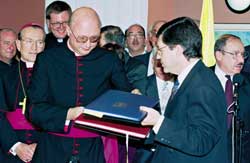 In an exclusive article,
In an exclusive article, 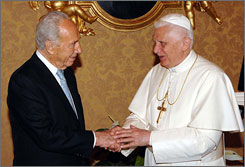 On September 9, 2007,
On September 9, 2007, 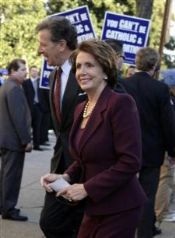 See also
See also  Note to Archbishop Wuerl -- here's an excerpt from a noteworthy memo from then-Cardinal Ratzinger to your predecessor (
Note to Archbishop Wuerl -- here's an excerpt from a noteworthy memo from then-Cardinal Ratzinger to your predecessor (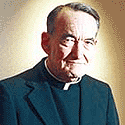
 Looking back at the presidential race, I can think of no more perfect an illustration of Democratic alienation from America's religious voters than the moment during the third debate, when a young woman by the name of
Looking back at the presidential race, I can think of no more perfect an illustration of Democratic alienation from America's religious voters than the moment during the third debate, when a young woman by the name of 












